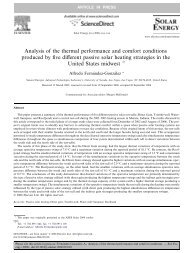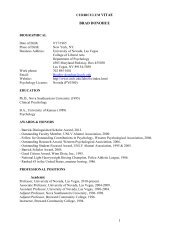2013 Conference Proceedings - University of Nevada, Las Vegas
2013 Conference Proceedings - University of Nevada, Las Vegas
2013 Conference Proceedings - University of Nevada, Las Vegas
- No tags were found...
You also want an ePaper? Increase the reach of your titles
YUMPU automatically turns print PDFs into web optimized ePapers that Google loves.
THE IMPACT OF LONG-TERM PROFESSIONAL DEVELOPMENT ONTEACHER SELF-EFFICACY: A CASE STUDYEileen Durand FaulkenberryTexas A&M <strong>University</strong>-CommerceEileen.Faulkenberry@tamuc.eduMaribeth NottinghamSoutheastern Oklahoma State <strong>University</strong>mnottingham@se.eduThis study examined the impact <strong>of</strong> a two-year pr<strong>of</strong>essional development on self-efficacy <strong>of</strong> ateacher participant and the effects it had on teacher practice and student outcomes. Thepr<strong>of</strong>essional development was focused on instructional practices to enhance student learning;was based on national and state standards; and incorporated peer collaboration withclassroom observations and support. Qualitative assessments <strong>of</strong> the participants showedgrowth. This study includes an in-depth case study <strong>of</strong> one <strong>of</strong> the participants showcasing hersignificant growth in confidence and improvements in her instructional practices.Effective pr<strong>of</strong>essional development builds on teacher’s prior knowledge and engages theteachers in learning that connects to their personal jobs, sense <strong>of</strong> community/collaborations andsustains long-term instructions (Hunzicker, 2010; Buczynski & Hansen, 2010). When theeducator is able to incorporate the training into practice, making connections and givenopportunities to take this training experience back into the classroom, then the pr<strong>of</strong>essionaldevelopment translates itself into something useful, memorable and becomes effectiveteaching. Authentic and supported development must be “job-embedded” and connected to thedaily routine <strong>of</strong> the teacher (Hunzicker, 2010). This form <strong>of</strong> pr<strong>of</strong>essional development allowsthe teacher to take risks, try new learning methods and strategies, and learn how to analyzetheir teaching style and student outcomes for effective lessons.Self-Efficacy is dependent upon a teacher having a good working content knowledge, anunderstanding <strong>of</strong> how students learn, and good motivational, reflective skills and methods(Bandura, 1993). Researchers Cantrell and Hughes (2008), in their study, Teacher Efficacy andContent Literacy implementation: An Exploration <strong>of</strong> the Effects <strong>of</strong> Extended Pr<strong>of</strong>essionalDevelopment with Coaching, found pr<strong>of</strong>essional development may promote increasedimplementation and efficacy.The purpose <strong>of</strong> this project was to provide a two-year pr<strong>of</strong>essional development througha Math and Science Teacher Academy (MASTA) grant project. The pr<strong>of</strong>essional developmentfeatures the critical components detailed by Desimone (2009). It is a long-term, supportedpr<strong>of</strong>essional development that is focused on content in mathematics and science, includes<strong>Proceedings</strong> <strong>of</strong> the 40 th Annual Meeting <strong>of</strong> the Research Council on Mathematics Learning <strong>2013</strong> 109




